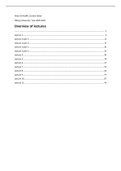College aantekeningen
Stress & Health lecture notes
- Instelling
- Tilburg University (UVT)
This is a document containing very elaborate notes on the Stress & Health lectures, given by M. Habibovic (and colleagues that gave the guest lectures).
[Meer zien]




